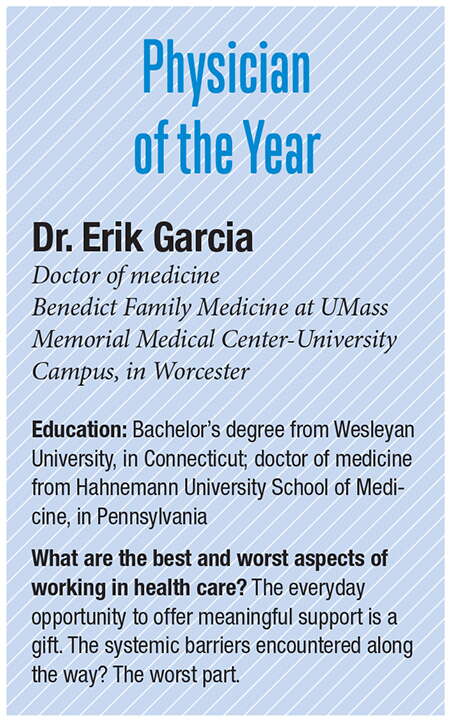
Champions of Health Care: 'There's not many people like Erik'
 Photo | Courtesy of UMass Memorial Health
Dr. Erik Garcia, doctor of medicine at Benedict Family Medicine at UMass Memorial Medical Center-University Campus
Photo | Courtesy of UMass Memorial Health
Dr. Erik Garcia, doctor of medicine at Benedict Family Medicine at UMass Memorial Medical Center-University Campus
Dr. Erik Garcia’s CV says “quality healthcare is a human right.”
This belief underscores all aspects of his effort to provide care to the underserved.
“When viewed through that lens, it makes sense to look at the people who are most disenfranchised, that have least access,” said Garcia.
When we recognize health care as a human right, the natural progression is to find who is being denied, he said. And for Garcia, a significant portion of that population are those who are minimally employed and uninsured.
“There's not many people like Erik,” said Justin Precourt, president of UMass Memorial Medical Center in Worcester. “He works day and night, tirelessly, to help meet the needs of the underserved and the Worcester community.”

In addition to his work as an internal medicine physician at UMass Memorial Health in Worcester, Garcia works closely with mobile medical clinic Road to Care. The van, staffed with UMMH providers, offers free medical care to the area’s unhoused population and those with active substance use disorders.
“The people we care for have so much to say and so few people to actually say it to who are healthcare professionals,” said Garcia.
Garcia serves on the board of DISMAS House, a Worcester nonprofit focused on the reintegration of formerly incarcerated people back into society.
He works with the Area Health Education Centers, traveling across the state and Connecticut giving talks on what homelessness is and how to care for people experiencing homelessness.
He educates medical students, speaking at university and mentoring them on how to communicate with patients and foster a supportive care environment.
“He treats his students and residents and mentees no different than he treats the patients he serves, right? With kindness, humility, compassion, and caring,” said Precourt.
Everyone feels at least a little vulnerable when going to see the doctor, a feeling which is only exasperated by trauma, said Garcia. Because of their previous experiences, these patients are particularly in tune to body language and being treated with respect.
“Compassion, respect, sometimes humor, sharing of yourself, all of these things come into play. And so it's just one ingredient that absolutely has to be present if you're going to help people who are experiencing trauma or experiencing vulnerability,” he said.
Garcia approaches his treatment of those clients the same as any other that he cares for in a standard setting.
“From an immediacy perspective, it involves listening to what people have to say, hearing people out. Letting people tell their story uninterrupted and with as little judgment as possible, he said.
From a longer-term perspective, building a trusting relationship with the populations he serves often takes time. Part of cultivating that trust is by following through on what he’s said he’s going to do and not promising things he can’t. Healthcare systems can make accessing care difficult, and Garcia discusses these potential hurdles with his patients.
He aims to express while he is part of a system that has caused them challenges before, he’s on their side.
“He knows the patients, they trust him,” said Precourt. “They listen to him, and he meets them where they're at with realistic expectations and really focuses solely on just doing what's right.”
The origin of Garcia’s motivation was from his father. Growing up in New York as a Latino man, his father was not always treated with the same degree of regard as he might have expected, said Garcia. His father always made it clear to him the simple yet crucial importance of treating people with respect.
“No one person is better than another person. We're all people. We're all deserving,” he said. “So you start to take care of a population; and you come in with that attitude, and you realize that people who've been treated badly, people who are living under difficult circumstances, really respond to that.”
Many of Garcia’s clients have a degree of shame and self recrimination coming from being homeless, especially if there’s substance use, he said. He works to show them he sees them as his peers.
Treating his patients this way not only benefits his clients, but it gives Garcia the privilege of working with them, he said. Without treating his patients with the humanity anyone deserves, they wouldn’t trust him to provide care.
“I see you as an equal human being, and I'm in the fortunate position where I can be helpful to you,” said Garcia. “That's a neat position to be in.”
Mica Kanner-Mascolo is a staff writer at Worcester Business Journal, who primarily covers the healthcare and diversity, equity, and inclusion industries.












0 Comments